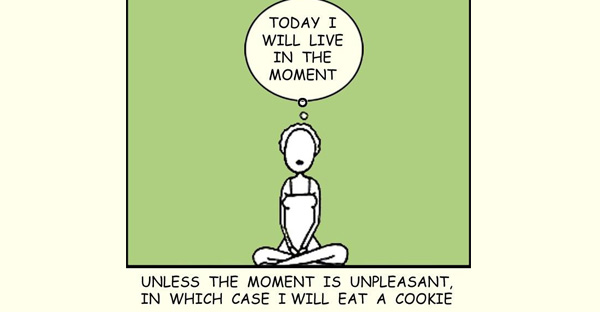

Healthy eating is easy to do when you’re organized, well rested, and being appreciated for your brilliance and hard work, right? But what about when you’re approaching a deadline at work, the mortgage payment is due, the kids are sick, and you’re realizing your pants are somehow getting smaller? Many people turn to food to comfort them.
Food cravings are often a sign of emotional stress. We respond by emotional eating which may work for a short time, but usually results in us feel even worse. Have you noticed when you are hungry emotionally and you try to satiate this with food it doesn’t work very well? This is because edible food is not an effective way to nourish emotional hunger. To overcome emotional eating we need to develop new coping tools to positively influence our thoughts, feelings, and actions. Here are some ideas.
Use awareness to distinguish which type of hunger you are experiencing. Do you have food cravings when your body needs calories (physical hunger), because you want to be sure you are getting enough nutrients (mental hunger), because you feel social pressure to eat (social hunger), or because you are eating to cope with a stressor (emotional hunger)? Practice listening to your thoughts and feelings to become aware of your motivation for eating. Also listen for what hidden beliefs do you have about yourself (I’m weak, I’ll never be able to do this…). Pay attention to how you feel before and after eating certain foods. Ask yourself, “what is this food feeding?”
Taking care of yourself helps you take care of others. It allows you to set a healthy example for your family and others around you.
Take some time to identify your rituals and triggers. Do you immediately go to the coffee pot after waking up? Do you drive by a bakery on your way to work that serves your favorite treat? Use awareness to recognize when you are eating because you are tired, bored, angry, etc. If you don’t know why you are triggered to eat, try temporary journaling. When you feel triggered, write down what things happened prior to that feeling. You may eventually see a common thread. Knowing our rituals and triggers gives us the information we need to develop new coping tools.
Many people say they just don’t have the time for a healthy lifestyle. This is the grown up version of “the dog ate my homework”. Not having enough time can just be a matter of not setting your priorities. What are your priorities? Dr. Edward Viljoen of The Center for Spiritual Living Santa Rosa suggests, “investigate what your emotional, physical, and social values are so you can go about getting them with full consciousness. Ask yourself, are my life’s actions in harmony with what I say I believe is important, valuable, and true? Fashion your life around what you care deeply about.” Make detailed goals and have some accountability. Many women in particular struggle with this issue because they may have a hidden belief that taking care of themselves before others is selfish. I invite you to consider the idea that taking care of yourself is not selfish. To give of yourself in a healthy manner your cup has to be full. What you give is from the overflow. Taking care of yourself helps you take care of others. It allows you to set a healthy example for your family and others around you. “When you have built a healthy, satisfying relationship with yourself, you have something of great worth to share with others.” -Dossie Easton & Janet Hardy
Make a list of alternatives to emotional eating. Identify your triggers, write down what you typically have done in the past in reaction to them, and then come up with at least 3 alternatives to respond to the triggers in a health promoting manner. Examples are exercising, calling a friend, eating something healthy, meditating, etc. Keep this list with you. When we are stressed we may not be able to remember these self-nurturing alternatives. Even if you don’t think they are going to work, make a commitment to try them out before you decide to eat.
Set your boundaries. Make a list of which foods are a “yes”, which are “maybe, sometimes”, and which are a “no”. I suggest making boundaries that are clear, strong, flexible, and conscious. This especially helpful when you feel social pressure to eat unhealthy foods. Respect your own limits and you may see that others respect them too. People tend to live up to your standards when you are not afraid to set them. Consider the thought that you do not needs others approval or acceptance. You can build a foundation of security within you that doesn’t need to be granted by another person and that no one else can take away.
When making a difficult decision, check in with yourself. Listen to your conscience or your highest self. Play the decision possibilities out in your mind to the end and check in with how you will feel at that time.
Take responsibility for your feelings. No matter what is happening, what you feel in response is determined inside of you. When you blame someone/something else for how you feel you disempower yourself from finding solutions.
Be present. This empowers you to deal with the current choice, in your current body and not dwell in the past or imagine what will happen in the future. Use past perceived failures as learning experiences. Do not let the past affect your future. Every new experience is an opportunity to make new choices. When you get off track, simply start again.
The feelings you have that motivate you to emotionally eat have a message to convey to you. Listen and accept (not condone, but accept) what they have to say and you will not have to repress them with food. They will let go of you naturally. Then you can respond instead of react to your emotions. Always remember that every experience is impermanent.
Savor the eating experience. Most eating is done without awareness, habitually. Pay attention to the sight, smell, texture, sound, and flavor or your food. Have you ever gotten to the end of a meal and realized you don’t know how it tasted? Then you get more because you want to actually taste it? Eat mindfully from the beginning. Recognize the difference between “full” and “no longer hungry”. Get over the thought that you need to clean your plate, just eat until you feel full.
Set yourself up to succeed. Ask yourself, does my lifestyle/environment encourage the manifestation of my goal? Do you have all the cooking materials necessary to cook healthy meals? Have you removed temptations from your household? Are you spending time with people who encourage you? What restaurants are you going to? When you go out to meet a friend do you go out for meal or for a walk in the park? Do you talk about the things you aspire to and are interested in or about what you are worried about or what you dislike?
Visualize success. How often to we watch ourselves fail in our own minds? Or replay our mistakes? What if you were to visualize yourself succeeding?
Reframe your thoughts. Replace the thought of “I can’t have that” with “I choose to have something else”. Instead of focusing on limitation or lack, focus your attention on abundance and gratitude for what you do have. And remember, you can learn to like new things.
Challenge your thoughts. Do you interpret the thought of “I just ate something bad” as “I am a bad person” or “I’ll never be able to do this”? Respond to these thoughts in the manner you would for a friend. Use a kind, compassionate voice with yourself. These thoughts could be challenged with this: “I made a decision that was not in my best interest. That does not mean I’m a failure or that I can’t make healthy decisions. I just feel that way right now because I just made an unhealthy choice, but every moment is another opportunity to make a different choice. So now, I’m going to be present and make a good choice in this moment.”
When you succeed, celebrate! When you make a good decision pay attention to how good you feel and relish that feeling. Keep a journal of your successes to motivate you.
You cannot force confidence or courage or discipline, but you can plant it, you can nourish it, and you can grow with it. Affirmations are a tool for nourishing yourself. Affirmations are positive statements in the present tense designed to train one’s consciousness in a constructive direction. “Repeating an affirmation is leading the mind to that state of consciousness where it accepts that which it wishes to believe.” says Dr. Ernest Holmes. Google “health affirmation” for ideas or come up with your own. Post them all over your house or memorize one you can say to yourself when you are in a challenging situation.
Annual cleansing of the body and mind can have immense benefits for supporting a healthy lifestyle. Water fasting such as at TrueNorth Health center can reboot your taste buds so that healthy foods taste more appealing. Silent meditation retreats can center and empower you emotionally and mentally.
In closing, I invite you to consider the possibility that health is possible for you. Is this something you have accepted? Are you attached to your views of yourself as unhealthy? Are you ready to let those thoughts or that identity go? Do you give permission to yourself to be healthy?
Savor: Mindful Eating, Mindful Life by Thich Nhat Hahn
cslsr.org
dhamma.org
truenorthhealth.com
Copyright 2026 Center for Nutrition Studies. All rights reserved.
Deepen Your Knowledge With Our
Plant-Based Nutrition
Certificate
Plant-Based Nutrition Certificate
- 23,000+ students
- 100% online, learn at your own pace
- No prerequisites
- Continuing education credits





